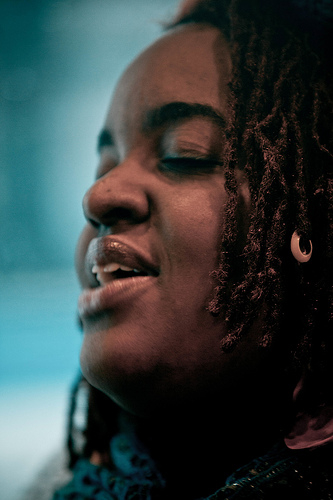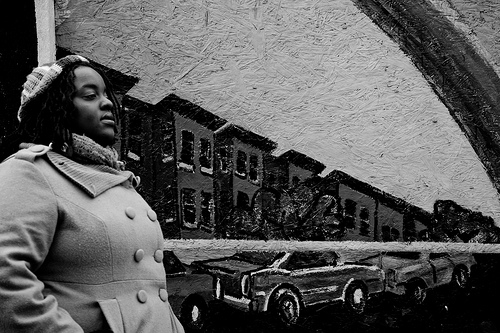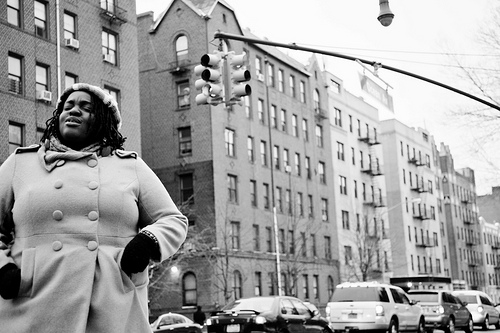This post is a follow-up to an interview with Haitian photographer Francesca Andre. It focuses on the enthralling subject of the new video that Andre has directed, spoken-word artist Melissa Beauvery.
Of Haitian parentage, Beauvery was born in the United States. Growing up in Brooklyn, she was surrounded by the lilt of Creole; the language was very much a part of her everyday experience. Her new spoken-word CD, “My Grandmother's Tongue”, which the video highlights, depicts her experience as a Haitian-American woman. She talks to Global Voices about her inspiration for the project, the importance of oral tradition, Haitian culture and the close-knit community that is the Haitian diaspora.
•••

Spoken-word artist Melissa Beauvery; photo by Francesca Andre
Janine Mendes-Franco (JMF): As a spoken-word artist, you continue the oral tradition that is so fundamental to Haitian (and Caribbean) culture. In what ways do you think that new media (e.g.: this video that you and Francesca have produced, as well as other social media avenues) will help to spread your message? Do you see new media as a useful tool?
Melissa Beauvery (MB): As a spoken-word artist, I believe that new media is, in this day and age, fundamental in spreading messages, ideas and movements at a much faster rate – and reaching a more diverse audience. The video Francesca has produced illustrated the project in a way ‘word of mouth’ or even just doing local performances and conferences would not be able to do. The video is an important element of spreading news about the project due to the power of visual communication. Part of the reason why I believe that oral tradition is so important because it allows you to capture image[s] through words. This gives artists such as myself and Francesca the opportunity to present more accurate and personal images of the lifestyles of Haitians around the world.
Spoken Word Artist: Melissa Beauvery from Victor Oliveira on Vimeo.
JMF: Your reverence for the Creole language is inspiring, particularly because it could have been considered “fringe” in the wider context of American society. Explain why it is so important to you and your work.
MB: My earliest childhood memory was hearing Creole. Because my grandmother was illiterate, instead of writing letters, she would record what she had to say on cassette tapes. I never would forget listening to a language that didn't mirror the languages of the cartoons that I often watched. Creole opened up a portal to self-discovery. Who am I? Why doesn't my grandmother speak English like ‘everyone’ else? It was because I was Haitian. Despite being born and mostly raised in Brooklyn, I was from somewhere else and I had to dig deeper to understand this Haitian identity that cannot be forgotten. This is why, even in my poems that are mostly in English, you will always hear at least a few words in Creole. This is part of my self-expression as a Haitian living in America. Creole is the heart of my project.

A still from the video "My Grandmother's Tongue"; photo by Francesca Andre
JMF: In the poem “My Grandmother’s Tongue”, you juxtapose white and black, light and dark. Haiti is often painted in mainstream media with a sombre brush, whereas this project honours everything that is strong and inspiring about the country and its people. As a Haitian-American, what is your vision of Haiti?
MB: The poem ‘My Grandmother's Tongue’ is a love poem. It represents my love for Haiti and my grandmother who was always Haiti to me. My grandmother [was] very patriotic, always made sure each trip was a learning experience. It was through my grandmother [that] I understood the beauty that is Haiti. Not everyone can appreciate its beauty. Haiti has a kind of beauty that needs particular vision. My vision of Haiti is love…that kind of love keeps a Brooklyn-born artist such as myself constantly inspired and eager to write. This tongue, my grandmother's tongue, is so important and was essential in my upbringing.
JMF: Can you share what it was like to work with such accomplished Haitian musicians and how the power of music helped to transform and add depth to your poetry?
MB: Because ‘My Grandmother's Tongue’ is my first project, I was very nervous and intimated working with all of the[se] accomplished musicians. I was also fearful that some of musicians who are more used to collaborating with vocalists would not be as enthusiastic because it was poetry and not singing. But to my surprise, all of the musicians were extremely helpful and offered their talent and advice. They understood me. The musicians truly breathe life into ‘My Grandmother's Tongue’. The instruments truly complement my words in a way I can't even verbalize; I am truly thankful for all of the giants that selflessly offered their talents.

Melissa Beauvery; photo by Francesca Andre
JMF: Tell us a little about the kinship of the Haitian community in the United States and what it has been able to accomplish.
MB: Many Haitians in the U.S. constantly have Haiti in mind. Even those who don't go back to Haiti, they are always sending money or paying for school for family members or even children of childhood friends. It becomes an obligation. For if we don't look out for family back home, who will? And kinship goes beyond particular bloodlines. This kinship also transforms artists into family. Francesca and I started sharing more ideas for different projects because we felt compelled to do more to promote a more accurate and humane image of Haitian people in Haiti and abroad. It is our obligation as a large family.







5 comments